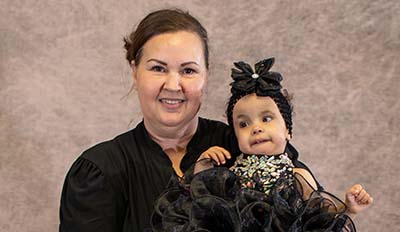Trisomy 18
In many ways, Tatelyn McMullan is like any other toddler. She says a few words, likes to play with an iPhone, dances in her daddy’s arms and tries to climb out of her crib. Tatelyn has entered three beauty pageants, bringing home three crowns, three trophies and five sashes. Her mom, Paula Weaver, describes her as happy, alert, very determined and a ball of energy.
What sets Tatelyn apart from other little girls her age, though, is that she was born with Trisomy 18 and fights the life-threatening challenges this chromosome disorder wreaks on her little body every day. Trisomy 18, sometimes called Edwards’ syndrome, is a congenital condition that causes severe developmental delays. Symptoms include low birth weight, a small abnormally shaped head, problems with feeding, breathing, sight and hearing as well as defects in the internal organs, especially the heart and lungs. Only 50% of babies with Trisomy 18 who are carried to term are born alive, and many live only a few days. Only 5% to 10% survive beyond the first year.
Paula and her husband, Louis, were blissfully unaware of Trisomy 18 and its dire prognosis when the couple took custody of Tatelyn at age 6 months in 2021. “We only knew she had a hole in her heart and was having seizures. We didn’t know anything about Trisomy 18,” Paula said.
The Weavers’ first visit to USA Children’s and Women’s Hospital in Mobile to be trained to care for the baby revealed the impact of the disorder. Tatelyn could not move, was very tiny and extremely weak, did not want to be held and was receiving her feedings via a nasogastric tube. Paula and Louis were told Tatelyn had only six months to live. “They told us to just love on her while we can,” Paula said.
Still, the Weavers—who also have a daughter, Ashanti, who has spina bifida, cerebral palsy and hydrocephalus—were undaunted by the high level of care and special needs Tatelyn required. “As soon as I walked in that room, I just fell in love with her,” Paula said. “I told DHR (Department of Human Resources), ‘Yes, I’ll take her, without a doubt.’ If Tatelyn was to have a chance, I knew I’d be the best bet.”
So the family headed home to McIntosh, Alabama, and settled into their new routine. The first month, Tatelyn did well, but then the hole in her heart caused her health to decline, and she was placed in hospice care. Specialists said Tatelyn was not a good heart surgery candidate and advised the Weavers that her death would be sudden and swift. “I told the doctors that I didn’t see what they saw. Tatelyn is a fighter,” Paula said.
Inspired by the Weavers’ determination to do everything possible for their daughter’s survival, Tatelyn’s Mobile providers referred Tatelyn to the Pediatric & Congenital Heart Center of Alabama at Children’s of Alabama. Cardiologist Dr. Mark Law agreed to evaluate Tatelyn for surgical repair of the hole in her heart. To do so, he performed a heart catheterization. Results were not what the family hoped they would be, and the Weavers were heartbroken. However, after a multidisciplinary conference with cardiac surgery, anesthesia, cardiology and cardiac intensive care, the decision was made to offer a high-risk surgery, and it was scheduled with Dr. Rob Sorabella.
Law told the family that Tatelyn’s medical team would move forward with the high-risk closure because, otherwise, she would not survive with her heart condition. He recognized that Tatelyn was a fighter and wanted to give her the best chance to survive.
The four-hour procedure went as expected, and Tatelyn did so well that she was discharged a mere four days afterward. Since that July 2022 surgery, Tatelyn has developed some complications and is closely monitored by her medical team at Children’s, but she has not needed to be hospitalized.
The Weavers understand that the surgery was a measure to prolong her life, not a cure for the impact of Trisomy 18, and that living in fear of all the “what ifs” was diminishing the joy to be found in all of Tatelyn’s accomplishments. So the family is making plans for Tatelyn’s third birthday party and looking forward to the holidays. “Everything she does is a miracle, and every morning is a miracle,” Paula said. “I treat her like she’s normal. We take common sense precautions, but I do everything with Tatelyn that I’d do with a normal baby. I just let her live.”











